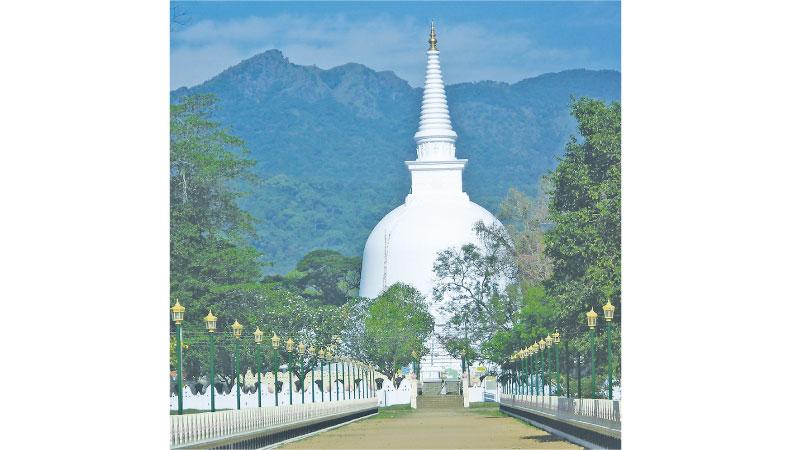
The primary ethical activity which a Buddhist learns to develop is to give up (Dāna), which forms a basis for further moral and spiritual development. In southern Buddhism, it is the first of ten ‘auspicious actions’ which produce ‘merit’: giving up, keeping the precepts, meditation, sharing merit, rejoicing at the merit of others, giving service, showing respect, teaching Dhamma, listening to Dhamma, and acting right.
Giving up
The key focus of giving up is the monastic Sangha, which depends on the laity for alms, such as, food, robes, medicine, and accommodation. The monks and nuns, by teaching and example, return a greater gift, ‘The gift of Dhamma excels all gifts’ (Dhammapadapāli, 354). Such acts of mutual giving form a key feature of the lay-monastic relationship: ‘Thus for monks, this holy life is lived in mutual dependence, for ferrying across the flood (of Samsāra), for the utter ending of Dukkha’ (Itivuttakapāli, III).
The Sangha moreover, is a potent field of ‘merit’, so that gifts ‘planted’ in it are seen as providing a good harvest of ‘merit’ for the donors. As alms bestow long life, good appearance, happiness and strength on the recipient, these, in a human or heavenly rebirth are said to be the karmic results of alms-giving (Amguttaranikāya, IV, 57). On the other hand, being stingy is said to lead to being poor (Majjhimanikāya, III, 205). Generosity is not only practised towards Sangha, but is a pervading value of Buddhist societies. Fielding Hall, a British official in nineteenth-century Burma, once asked for a bill at what he had taken to be a village restaurant, and found that he had been a guest in a private house!
Buddhists are keen to give their assistance, goods and money at an ordination, funeral, festival or illness, so as to do ‘merit’, and share it with others. A fairly common practice is to contribute to the costs of printing Buddhist books for free distribution. Communities are bound together in acts of communal ‘merit’-making, and obligations are fulfilled by contributing to a ceremony sponsored by someone who has previously helped one. Some ceremonies can be expensive, so that a rich person may help sponsor the ordination of a poor person’s son.
While any act of giving up is seen as generating ‘merit’, this becomes more abundant as the motive becomes purer. Giving up may initially be performed for the sake of material karmic results, but the joy and contentment that it brings is likely to provide the motive. The constant practice of giving up helps spiritual development by reducing possessiveness, cultivating a transparent and sensitive attitude towards others, and expressing non-attachment and renunciation, reflected in the practice of ‘giving up’ home and family life to become a monk or nun. Giving up is also the first of the Bodhisttva ‘perfections’, according to all traditions.
Keeping the precepts
On the basis of developing Dāna, the Buddhist cultivates Sīla (virtue) by observing ethical precepts, the most common of which are the ‘five virtues’ (Pañcasīla). The avowal of each of these begins thus: ‘I undertake the rule of training to abstain from…’. The five abstentions are: (i) harming living beings (ii) taking what is not given (iii) misconduct concerning sensual-pleasures (iv) false speech and (v) unmindful states due to alcoholic drinks or drugs. Each precept is a ‘rule of training’-as is each item of the monastic code-which is a promise or vow to oneself. They are not ‘commandments’ from without, though their difference from these in practice can be exaggerated.
In societies where Buddhism is the dominant religion, they become expected norms for people to seek to live by. Moreover, while the ‘taking’ of the precepts, by ritually chanting them, could be done by a layperson at any time, they are frequently observed by chanting them after a monk, who fulfils the role of administering them. In such a context, the resolve to keep the precepts has a greater psychological impact, and thus generates more merit.
In southern Buddhism, the five precepts are chanted at most ceremonies, and often on a daily basis. People try to live up to them as best they can, according to their commitment and circumstances, but with particular care on observances or festival days. In East Asia, when Buddhism is only one ingredient in the religious situation, the precepts are only taken by those with a fairly strong commitment to Buddhism. In China, they are first taken perhaps during a stay at a monastery, at a ‘lay ordination’ ceremony, which makes a person a recognized layman (Upāsako) or laywoman (Upāsikā).
The precepts are then regarded as weighty vows, so that a person may omit one if he feels he cannot live up to it (the first is never omitted, though).
In Soto Zen, devout laypeople take the precepts at Jūki, a week-long set of ceremonies held every spring while staying at a temple. First-timers also have a lay ordination ceremony. The precepts consist of the ‘three pure precepts’ and ‘ten great precepts’. The former are, ‘Cease from evil, do only good, do good for others’, the latter are equivalent to the first four of the five precepts, plus: (v) not taking or selling drugs or alcohol, (vi) not speaking ill of others, (vii) not praising oneself and abusing others, (viii) not being mean in giving Dharma or wealth, (ix) not being angry, and (x) not defaming the ‘three jewels’.
The writer is attached to the Department of Philosophy, Faculty of Arts, University of Peradeniya
